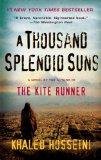Summary | Excerpt | Reading Guide | Reviews | Beyond the Book | Readalikes | Genres & Themes | Author Bio

"What rich lies!" Nana said after Jalil left. "Rich man telling rich lies. He
never took you to any tree. And don't let him charm you. He betrayed us, your
beloved father. He cast us out. He cast us out of his big fancy house like we
were nothing to him. He did it happily." Mariam would listen dutifully to this.
She never dared say to Nana how much she disliked her talking this way about
Jalil. The truth was that around Jalil, Mariam did not feel at all like a
harami. For an hour or two every Thursday, when Jalil came to see her, all
smiles and gifts and endearments, Mariam felt deserving of all the beauty and
bounty that life had to give. And, for this, Mariam loved Jalil.
Even if she had to share him.
Jalil had three wives and nine children, nine legitimate children, all of
whom were strangers to Mariam. He was one of Herat's wealthiest men. He owned a
cinema, which Mariam had never seen, but at her insistence Jalil had described
it to her, and so she knew that the façade was made of blue-and-tan terra-cotta
tiles, that it had private balcony seats and a trellised ceiling. Double
swinging doors opened into a tiled lobby, where posters of Hindi films were
encased in glass displays. On Tuesdays, Jalil said one day, kids got free ice
cream at the concession stand.
Nana smiled demurely when he said this. She waited until he had left the
kolba, before snickering and saying, "The children of strangers get ice cream.
What do you get, Mariam? Stories of ice cream."
In addition to the cinema, Jalil owned land in Karokh, land in Farah, three
carpet stores, a clothing shop, and a black 1956 Buick Roadmaster. He was one of
Herat's best-connected men, friend of the mayor and the provincial governor. He
had a cook, a driver, and three housekeepers.
Nana had been one of the housekeepers. Until her belly began to swell.
When that happened, Nana said, the collective gasp of Jalil's family sucked
the air out of Herat. His in-laws swore blood would flow. The wives demanded
that he throw her out. Nana's own father, who was a lowly stone carver in the
nearby village of Gul Daman, disowned her. Disgraced, he packed his things and
boarded a bus to Iran, never to be seen or heard from again.
"Sometimes," Nana said early one morning, as she was feeding the chickens
outside the kolba, "I wish my father had had the stomach to sharpen one of his
knives and do the honorable thing. It might have been better for me." She tossed
another handful of seeds into the coop, paused, and looked at Mariam. "Better
for you too, maybe. It would have spared you the grief of knowing that you are
what you are. But he was a coward, my father. He didn't have the dil, the heart,
for it."
Jalil didn't have the dil either, Nana said, to do the honorable
thing. To stand up to his family, to his wives and in-laws, and accept
responsibility for what he had done. Instead, behind closed doors, a face-saving
deal had quickly been struck. The next day, he had made her gather her few
things from the servants' quarters, where she'd been living, and sent her off.
"You know what he told his wives by way of defense? That I forced myself on
him. That it was my fault. Didi? You see? This is what it means to be a woman in
this world." Nana put down the bowl of chicken feed. She lifted Mariam's chin
with a finger. "Look at me, Mariam."
Reluctantly, Mariam did.
Nana said, "Learn this now and learn it well, my daughter: Like a compass
needle that points north, a man's accusing finger always finds a woman. Always.
You remember that, Mariam."
Excerpt from A Thousand Splendid Suns by Khaled Hosseini, by arrangement with Riverhead Books, a member of Penguin Group (USA), Inc., Copyright (c) 2007 by ATSS Publications, LLC.
Your guide toexceptional books
BookBrowse seeks out and recommends the best in contemporary fiction and nonfiction—books that not only engage and entertain but also deepen our understanding of ourselves and the world around us.